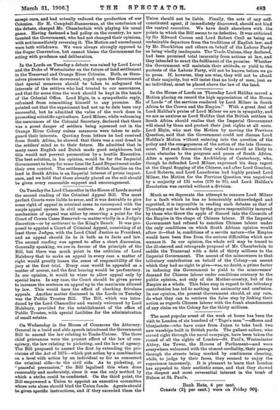On Tuesday the Lord Chancellor in the House of Lords
moved the second reading of the Criminal Appeal Bill. The most perfect Courts were liable to error, and it was desirable to give some right of appeal in criminal cases to correspond with the ample appeal system in civil matters. At present the only mechanism of appeal was either by reserving a point for the Court of Crown Cases Reserved—a matter wholly in a Judge's discretion—or by certiorari to the King's Bench. It was pro- posed to appoint a Court of Criminal Appeal, consisting of at least three Judges, with the Lord Chief Justice as President, and an appeal should lie to it both as to facts and law. The second reading was agreed to after a short discussion. Generally speaking, we are in favour of the principle of the Bill, but there was much point in the criticism of Lord Halsbury that to make an appeal in every case a matter of right would greatly lessen the sense of responsibility of the jury at the first trial. Every case would be appealed as a matter of coarse, and the first hearing would be perfunctory. In our opinion, it would be wiser to allow appeal only by special leave. In any ease, the Court should be given power to increase the sentence on appeal up to the maximum allowed by law. This would have the effect of checking frivolous appeals. Another matter discussed in the Lords on Tuesday was the Public Trustee Bill. The Bill, which was intro. duced by the Lord Chancellor and warmly welcomed by Lord Halsbury, provided for the establishment of the office of Public Trustee, with special facilities for the administration of small estates.










































 Previous page
Previous page